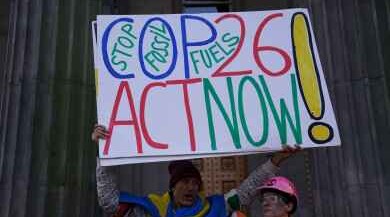Countries must deliver on climate pledges, says COP26 president Alok Sharma
The UN climate talks are entering their second week with ministers arriving for the political stage of the negotiations

The UN climate talks are entering their second week with ministers arriving for the political stage of the negotiations, while today also sees a focus on support for poorer countries to cope with climate change.
It comes after leaders and countries signed up to a range of initiatives last week from tackling deforestation to curbing coal power and cutting methane to prevent dangerous global warming.
Sharma said finding consensus among almost 200 countries – needed for agreement under the UN climate system – was not going to be straightforward but progress last week demonstrated a “constructive spirit” among negotiators.
The announcements countries made last week are not necessarily included in their national plans for action this decade, which leave the world far off track on meeting the internationally agreed goal of trying to limit global warming to 1.5 degrees to avoid the worst impacts of climate change.
Negotiators are trying to hammer out a “cover decision” from Glasgow that will set out how countries will close the gap between the action plans to cut emissions in this decade and what is needed to avoid temperature rises of more than 1.5 degrees.
Vulnerable countries are pushing for nations to revisit their plans, known as nationally determined contributions (NDCs), annually to close the gap, but others are pushing back against speeding up the process from its five-yearly cycle.
Sharma said: “Here in Glasgow we have a unique opportunity to reach a historic outcome and I am committed to bringing countries together to forge an agreement that means we see more action this decade, which helps to keep the 1.5 degrees temperature limit within reach.”
He said there was a need for urgency in the negotiations, and warned: “Last week countries made commitments which will all help to protect our planet but they must be delivered on and accounted for.”
Making sure countries increase ambition this decade is one of the issues up for debate, along with finance for poorer countries to develop cleanly and cope with climate impacts, and funding for them to deal with loss and damage.
Ministers also need to hammer out the last parts of the Paris Agreement – under which countries agreed in 2015 to limit temperature rises to “well below” 2 degrees, or 1.5 degrees to prevent the worst impacts of warming – to make it operational.
This morning countries will meet for a presidency update on the past week and progress of the negotiations.
